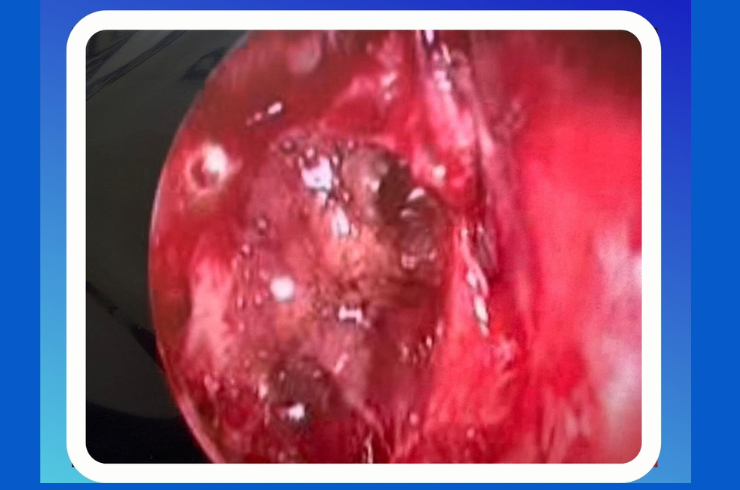CSF Leak Surgery at Asian ENT Care Centre, Hyderabad
Cerebrospinal fluid (CSF) leak surgery is a specialized procedure aimed at repairing leaks of the fluid that surrounds the brain and spinal cord. CSF leaks can occur due to trauma, surgery, or spontaneous conditions, leading to symptoms such as headaches, neck pain, nausea, and dizziness.
At Asian ENT Care Centre in Hyderabad, we offer CSF leak surgery performed by skilled surgeons with expertise in the latest diagnostic and surgical techniques. Our goal is to repair the leak, alleviate symptoms, and restore your quality of life.
What is a CSF Leak?
Cerebrospinal fluid (CSF) is a clear fluid that surrounds and protects the brain and spinal cord. A CSF leak occurs when this fluid escapes through a tear or hole in the membranes surrounding the brain or spinal cord. The leak typically happens in the dural sac — the tough membrane encasing the brain and spinal cord — and can cause a range of neurological and physical symptoms.
Causes of CSF Leak
- Trauma or Injury: A head injury, skull fracture, or neck injury can cause a tear in the dura and lead to a CSF leak.
- Spontaneous Leaks: In some cases, CSF leaks can occur without a clear injury. This can be due to structural abnormalities or weakness in the dura.
- Previous Surgery: Past surgeries, particularly those involving the brain or spine, can sometimes result in a CSF leak.
- Spinal Surgery or Procedures: Certain medical procedures, like lumbar punctures or epidural injections, can inadvertently cause a CSF leak.
Symptoms of CSF Leak
- Severe Headache: Often worsens when standing up and improves when lying down. This is called a “postural” headache.
- Neck Pain: The leakage of CSF can cause tension and discomfort in the neck region.
- Nausea and Vomiting: Due to pressure changes in the brain.
- Dizziness or Vertigo: A feeling of imbalance or spinning.
- Visual Disturbances: Blurred or double vision.
- Hearing Issues: Tinnitus (ringing in the ears) or hearing loss.
- Clear Fluid Draining from the Nose or Ears: A telltale sign of a CSF leak.
Diagnosing CSF Leak
To diagnose a CSF leak, our doctors typically use:
- MRI of the Brain and Spine: Provides detailed images to detect leaks or abnormalities in the dura.
- CT Myelography: A specialized imaging technique that can pinpoint leaks in the spine.
- Nasal Endoscopy: If the leak is suspected in the nasal cavity, an endoscope may be used to examine the area.
- Beta-2 Transferrin Test: A diagnostic test that can identify CSF in nasal discharge or fluid from the ears.
Treatment Options for CSF Leak
In most cases, CSF leaks can be managed with conservative treatments such as bed rest, increased hydration, and pain management. However, if the leak does not resolve or symptoms persist, surgical intervention may be required.
CSF Leak Surgery
The surgical procedure for a CSF leak aims to repair the tear or hole in the dura that is allowing the fluid to escape. This is typically done through the following approaches:
- Endoscopic Surgery: Using a small camera (endoscope), the surgeon can repair the leak with minimal incisions. This technique is commonly used for leaks in the nasal area or skull base.
- Craniotomy or Spinal Surgery: In more complex cases, a craniotomy (for leaks in the skull) or spinal surgery (for leaks in the spine) may be necessary to access and repair the dural tear.
- Autologous Blood Patch: This involves injecting the patient’s own blood into the area of the leak, which helps seal the hole. This is often used for leaks near the spine or brain.
The Surgery Process
- Preoperative Assessment: Detailed imaging and tests are done to locate the precise leak site.
- Anesthesia: The surgery is performed under general anesthesia to ensure comfort and safety.
- Surgical Repair: The surgeon identifies the leak, repairs it, and seals the dural tear using specialized techniques.
- Postoperative Care: Patients are monitored in a hospital setting for a few days. A drain may be placed to manage any fluid buildup.
Recovery After CSF Leak Surgery
- Hospital Stay: Typically, patients stay in the hospital for 1-2 days after surgery. In rare cases, a longer stay may be required for monitoring.
- Pain Management: Over-the-counter or prescription pain medications may be prescribed to manage discomfort.
- Activity Restrictions: Strenuous activity, bending, or lifting should be avoided during recovery to allow the surgical site to heal properly.
- Follow-up: Regular follow-up visits to monitor healing and ensure the leak is successfully sealed.
Risks and Complications
As with any surgery, there are risks associated with CSF leak surgery, including:
- Infection: At the surgical site or in the central nervous system.
- Recurrence of Leak: In some cases, the leak may return, requiring additional treatment or surgery.
- Nerve Damage: Particularly in cases involving spinal or brain surgery.
- CSF Reabsorption Issues: Rarely, the body may have difficulty reabsorbing the CSF, leading to complications.
Why Choose Asian ENT Care Centre for CSF Leak Surgery?
- Experienced Surgeons: Our ENT specialists are highly skilled in performing advanced surgeries for CSF leaks with high success rates.
- Comprehensive Care: From diagnosis to recovery, we provide complete care for patients with CSF leaks, ensuring the best outcomes.
- State-of-the-Art Facilities: We use the latest diagnostic tools and minimally invasive techniques to treat CSF leaks effectively and safely.
- Personalized Treatment: Each patient receives a tailored treatment plan based on their specific condition and needs.
Book a Consultation Today
If you suspect you have a CSF leak or are experiencing symptoms like chronic headaches, neck pain, or fluid drainage from the nose or ears, book a consultation with our expert ENT specialists at Asian ENT Care Centre, Hyderabad. We are dedicated to providing precise diagnoses and advanced treatments for all your ear, nose, and throat health needs.
